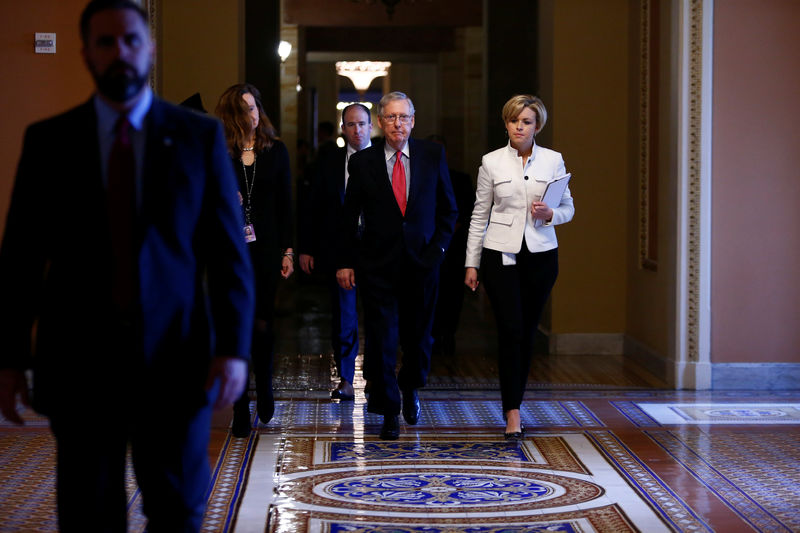By Lawrence Hurley and Andrew Chung
WASHINGTON (Reuters) - Senate Republicans on Thursday crushed a Democratic blockade of President Donald Trump's U.S. Supreme Court nominee in a fierce partisan brawl, approving a rule change dubbed the "nuclear option" to allow for conservative judge Neil Gorsuch's confirmation by Friday.
With ideological control of the nation's highest court at stake, the Republican-led Senate voted 52-48 along party lines to change its long-standing rules in order to prohibit a procedural tactic called a filibuster against Supreme Court nominees. That came after Republicans failed by a 55-45 tally to muster the 60-vote super-majority needed to end the Democratic filibuster that had sought to deny Gorsuch confirmation to the lifetime post.
The Senate's action paved the way to confirm Gorsuch by simple majority, with a vote expected at roughly 7 p.m. (2300 GMT) on Friday. Republicans control the Senate 52-48. The rule change was called the "nuclear option" because it was considered an extreme break with Senate tradition.
Trump had encouraged Republican Senate Majority Leader Mitch McConnell to "go nuclear." Confirmation of Gorsuch would represent Trump's first major victory since taking office on Jan. 20, after setbacks on healthcare legislation and his blocked order to prevent people from several Muslim-majority nations from entering the United States.
Senate confirmation of Gorsuch, a Colorado-based federal appeals could judge, would restore the nine-seat court's 5-4 conservative majority, enable Trump to leave an indelible mark on America's highest judicial body and fulfill a top campaign promise by the Republican president. Gorsuch, 49, could be expected to serve for decades.
"This will be the first and last partisan filibuster of the Supreme Court," McConnell said on the Senate floor, accusing Democrats of trying to inflict political damage on Trump and to keep more conservatives from joining the high court.
"In 20 or 30 or 40 years, we will sadly point to today as a turning point in the history of the Senate and the Supreme Court, a day when we irrevocably moved further away from the principles our founders intended for these institutions: principles of bipartisanship, moderation and consensus," Senate Democratic leader Chuck Schumer said on the Senate floor.
Schumer ridiculed McConnell's contention that the Democratic action was unprecedented, noting that the Republican-led Senate last year refused to consider Democratic former President Barack Obama's nomination of appellate judge Merrick Garland for the same high court seat that Trump selected Gorsuch to fill.
With three of the court's justices 78 or older, Trump told reporters he hoped to appoint as many as four Supreme Court justices, a move likely to make it overwhelmingly conservative.
"In fact, under a certain scenario there could even be more than that," Trump said aboard Air Force One en route to a meeting with China's president in Florida, adding that the Senate rule change would not alter how he picks court nominees.
A conservative-majority court is more likely to support broad gun rights, an expansive view of religious liberty, abortion regulations and Republican-backed voting restrictions, while opposing curbs on political spending. The court also is likely to tackle transgender rights and union funding in coming years.
The Supreme Court has had a vacancy since conservative Justice Antonin Scalia died in February 2016.
A 60-vote threshold giving the minority party power to hold up the majority party has forced the Senate over the decades to try to achieve bipartisanship in legislation and presidential appointments.
THREE DEMOCRATS
In the end, three Democratic senators up for re-election in 2018 in states won by Trump last year - Indiana's Joe Donnelly, West Virginia's Joe Manchin and North Dakota's Heidi Heitkamp - broke with their party and voted with Republicans to bring about a confirmation vote, though they opposed the rule change.
Republicans have called Gorsuch superbly qualified and one of the nation's most distinguished appellate judges.
Democrats accused Gorsuch of being so conservative as to be outside the judicial mainstream, favoring corporate interests over ordinary Americans in legal opinions, and displaying insufficient independence from Trump.
What Republicans did to Obama's nominee Garland was worse than a filibuster, Schumer said. Schumer said Republicans denied "the constitutional prerogative of a president with 11 months left in his term."
"The nuclear option was used by Senator McConnell when he stopped Merrick Garland. What we face today is the fallout," Democratic Senator Richard Durbin added on the Senate floor.
McConnell blamed the escalation of fights over judicial nominees on the Democrats and their opposition starting three decades ago to nominees made by Republican former Presidents Ronald Reagan and George W. Bush.
McConnell called the Democratic effort against Gorsuch "another extreme escalation in the left's never-ending drive to politicize the court and the confirmation process."
Experts said eliminating the filibuster for Supreme Court appointments could make it more likely that presidents, with little incentive to choose centrist justices who could attract support from the other party, will pick ideologically extreme nominees in the future.
Ending the filibuster also would make it easier for future Supreme Court nominees to be confirmed when the president and Senate leadership belong to the same party.
The filibuster in one form or another dates back to the 19th century but assumed its current form in the 1970s.
While Democrats opposed the rule change and accused Republicans of a power grab, it was their party that first resorted to the nuclear option when they controlled the Senate in 2013. In the face of Republican filibusters of Obama appointments, they barred filibusters for executive branch nominees and federal judges aside from Supreme Court justices but still allowed it for Supreme Court nominees and legislation.
The Republican-backed rule change maintains the ability to filibuster legislation.
